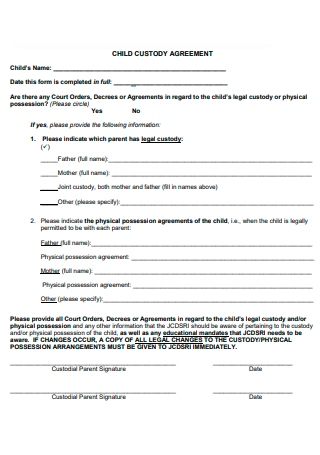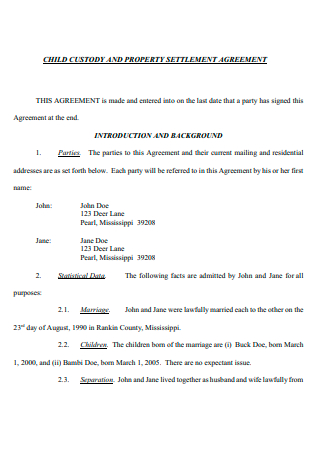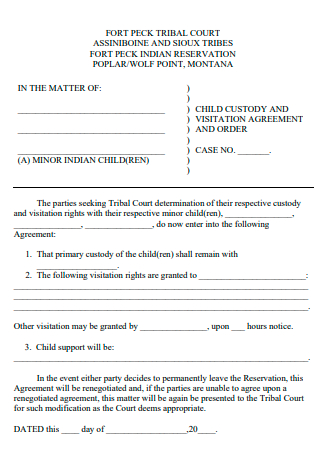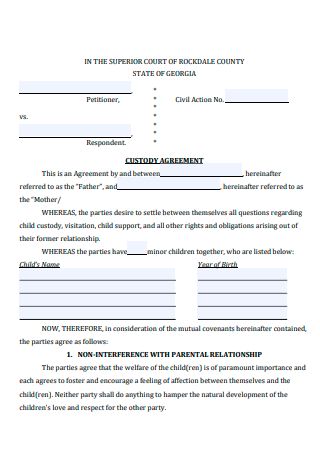4+ Sample Child Custody Agreement
FREE Child Custody Agreement s to Download
4+ Sample Child Custody Agreement
What Is a Child Custody Agreement?
What Is Included In a Child Custody Agreement?
Who Are The Parties Involved In a Child Custody Agreement?
What Are The Types Of Child Custody Orders?
Types of Visitation Orders
Steps In Filing For Child Custody:
FAQs
What happens if a child custody agreement is violated?
Is hiring a lawyer important for a child custody agreement?
How do you prove a custodial parent is unfit?
How does the judge decide custody if the parents are not married?
What Is a Child Custody Agreement?
A Child Custody Agreement or Child Custody Contract is a type of written document which details the procedures for child custody between the parents of a child or children. These arrangements are generally issued in line with a separation or divorce proceeding. It may encompass various instructions regarding:
- Which parent has primary physical custody of the child;
- Which parent has legal custody of the child, usually the same parent that is granted physical custody;
- Whether custody will be split equally between the parents, or whether one parent will have more physical custody time; and
- Visitation schedules for the non-custodial parent.
Furthermore, the custody agreement may address several other issues. Examples of this would be child support provisions, and whether or not other parties can assume custody of the child, such as a grandparent or close relative.
When determining child custody rights, child custody law places the child’s interests and background first. The child’s needs are placed before any of the parent’s personal preferences. This is known as the “child’s best interest standard”, which is the main standard for child custody cases. Courts will only make child custody verdicts if they benefit the child.
Child custody laws can be composite, and state laws on the subject will differ by jurisdiction. Determining custody rights over a child or children must be done with boundless care, as such decisions have profound and lasting impacts on the child.
What Is Included In a Child Custody Agreement?
A child custody agreement letter will detail matters such as custody and visitation calendars. Parents who are able to communicate and negotiate with each other may be able to draft a child custody agreement on their own, therefore avoiding child custody proceedings. Yet again, each state maintains their own laws concerning child custody and child custody agreements. Per se, you should acquaint yourself with the laws of your jurisdiction before taking any action.
In addition, a child custody agreement could be considered a form of a parenting plan. Although the needs of each family will vary, the following is generally what is comprised in a child custody agreement:
- A classification of the type of custody arrangement each parent has agreed to;
- Which parent has legal custody, and which parent has physical custody;
- Parenting time calendars, including visitation schedules, vacations, weekends, and holidays;
- Details concerning significant issues such as religion, education, and extracurricular activities;
- Details about pick-up and drop-offs to and from the parental home; and
- A section which outlines how parents may make changes to the child custody arrangement should the need for change arise.
When conscripting a child custody agreement, it is vital to be as specific as possible. This will help reduce the need for any modification later on. Moreover, it is important to remember that a court must approve to and certify the agreement, in order for the agreement to be enforceable under state laws. If any part of it is not drafted with the child’s best interests in mind, it is unlikely that the court will do so, and the agreement will need to be revised.
Who Are The Parties Involved In a Child Custody Agreement?
Most child custody agreements refer to the child’s biological parents, as well as the child or children that are to be affected by the contract. Nevertheless, this can differ depending on the family arrangements. Other parties who may be mentioned in a child custody agreement might include:
- Step-parents;
- Grandparents;
- Other close relatives; and
- Adoptive parents, if there are any.
Per se, child custody arrangements can generally be tailored to meet the exact needs of the children, as well as the several caretakers that may be involved in the custody arrangement.
Again, any custody determinations require to be made with the child’s best interests in mind. If an arrangement is not in the child’s best interest, it is not likely that the party will be stated in the child custody agreement. An example of this would be if a certain adult has been abusive to the child in the past—that person most likely will not be granted any custody privileges in the child custody contract.
What Are The Types Of Child Custody Orders?
There are two kinds of child custody:
Legal custody—which means the one who makes imperative decisions for your children (like the health care, education, and welfare), and Physical custody—which means who your children live with.
Legal Custody
- Joint—where both parents share the right and duty to make the significant decisions about the health, education, and welfare of the children.
- Sole—where only one parent has the right and duty to make the significant decisions about the health, education, and welfare of the children.
Parents with legal custody make decisions or choices about their children’s:
- School or child care
- Religious events or institutions
- Psychiatric, psychological, or therapy needs or other mental health counseling or
- Doctor, dentist, orthodontist, or other health professional (except in emergency situations)
- Travel
- Sports, summer camp, vacation, or extracurricular activities
- Residence (where the children will live)
- Both parents who share legal custody have the right to make decisions about these parts of their children’s lives, but they do not have to reach agreement on every decision. Either parent can make a decision alone. Nevertheless, to avoid having problems and ending up back in court, both parents should have a proper communication with each other and have a teamwork in making decisions together.
Physical Custody
- Joint—which means that the children live with both parents.
- Sole or primary—which means the children live with only one parent most of the time and just visit the other parent.
Joint physical custody does not mean that the children must spend exactly half the time with each parent. Sometimes, the children spend a little more time with one parent than the other because it is hard to split the time exactly in half. When one parent has the children more than half of the time, then that parent is sometimes called the “primary custodial parent.”
Oftentimes, a judge gives parents joint legal custody, but not joint physical custody. This means that both parents share the duty for making significant decisions in the children’s lives, but the children live with one parent most of the time. The parent who does not have physical custody usually has visitation with the children.
Types of Visitation Orders
Visitation or “time-share” is the agreement for how the parents will share time with the children. A parent who has the children less than half of the time has visitation with the children. Visitation orders are diverse, depending on the situation of the parents, best interests of the children, and other factors. Overall, visitation can be:
The law articulates that the judges must allow custody according to what is in the “best interest of the child.” To decide what is best for a child, the court will consider:
- Age of the child,
- Health of the child,
- Emotional ties between the parents and the child,
- Ability of the parents to care for the child,
- Any history of family violence or substance abuse, and
- Child’s ties to school, home, and his or her community.
In addition to custody orders, the judge will perhaps also make child support orders. Bear in mind that a child support order is separate from child custody and visitation, so you cannot refuse to let the other parent see the children just because he or she is not making the child support payments that the court ordered. And on the other hand, just because the other parent is not letting you see your children, it does not mean you cannot refuse to pay child support. But child support and custody are related because the amount of time each parent spends with the children will affect the amount of child support.
Sometimes, courts give custody to someone other than the parents because it is in the best interest of the children if giving custody to either parent would harm the children. This is called guardianship—someone who is not the parent asks for custody of the children because the parents cannot care for them.
Steps In Filing For Child Custody:
Step 1: File the custody complaint
To start a custody case, you need to file a custody complaint with the court in the county where the parent or the child resides or in the county where the child is physically present. There is a filing fee to start the custody case. If you cannot pay for the fee, you can fill out a form called, “Petition to Sue as an Indigent” and request that the court waive the filing fee for you.
Step 2: Get the custody papers served
You will have to make sure that the defendant is served with copies of the documents you have filed. If a defendant is represented by an attorney, the defendant may consent to service on his/her attorney in what is known as an “acceptance of service.” If the defendant is out of country or cannot be reached, consult with an attorney to find other ways serve the custody papers to the defendant.
Step 3: Parenting classes and mediation
You and the defendant will be required to attend a parenting education class before moving forward with your case. Both of you will take the parenting classes separately.
Step 4: Attend the trial
Your custody case will then go to trial before a judge if the mediation is not successful or not required due to domestic violence. During the trial, you and the defendant have the right to present evidence (such as your own testimony, witnesses’ testimony, relevant documents like police reports or medical records that could prove domestic violence). The judge will consider the evidence submitted by you and the other parent and make a decision about who would have custody—type of custody the person would have, and the type of visitation the non-custodial parent would have.
FAQs
What happens if a child custody agreement is violated?
The minute a parent violates a court-ordered or agreed-upon parenting plan, they run the risk of being held in disdain of court. Aside from that, they could face custody and visitation-related consequences if the court considers it to be a grave and consistent enough issue.
A parent could be held in contempt for the following:
- Deliberately and repeatedly violating visitation times;
- Failing to bring back your child to the other parent on time or at all;
- Trying to alienate your child against the other parent;
- Refusing to allow the other parent to see your child according to the plan.
Being in contempt of court is a grave matter that should not be taken lightly. If the other parent is successful in getting the court to hold you in contempt, they may not only need you to follow the parenting plan, but you could also face supplementary repercussions. This may include attending and completing a parenting class, going to counseling with the other parent, and attending additional check-in hearings in the forthcoming.
In the consequences for violating a parenting plan in which a parent has been denied time with their child by the contempt parent, the court may do the following:
Rule that they should get more make-up time with the child.
If the violations are recurrent or tremendously serious in nature, such as one parent trying to escape the state or country with the child, the court may decide to do an alteration with the custody and visitation plan, giving the other parent more custody rights or even outright stripping the violating parent of their custodial rights.
In some cases, they may also need the parent to spend time behind bars for their violations as well.
Other penalties that may be enforced include compensation for civil penalties and/or attorney fees.
Bear in mind, the judge will usually only make modifications to an agreement or parenting plan if they are certain that the parent will still not be able to follow the parenting plan in the forthcoming. Likewise, violations must accurately be significant enough to warrant penalties. Merely failing to return your child one time once or twice should not allow for the other parent to pursue this deed against you.
Is hiring a lawyer important for a child custody agreement?
Some parents do not hire a lawyer for custody cases, however, some situations call for a legal counsel. If your circumstances are complex or involve abuse in any form, a child custody lawyer can be an important advocate.
How do you prove a custodial parent is unfit?
You prove a custodial parent is unfit according to the testimony of the therapists, counselors, teachers, coaches, and other people who are familiar with some instances in which the parent showed an unfit behavior.
How does the judge decide custody if the parents are not married?
The mother has the sole legal and physical custody of the child if there is no presence of the court order about the custody of the child. Meanwhile, an unmarried father does not have a right to custody or parenting time until paternity is established. Paternity is who is legally the father of the child—there should be a signed form called Recognition of Parentage.
Children do not need to suffer in a household that no longer grows out of love and compassion. Offering parents the chance to separate through a legal proceeding should also mean giving their children what is best for them. With the Child Custody Agreement being an available option, the court will help decide for the benefit of the children—which means whatever is the result of the trial is for the betterment of both the parents and the children.





